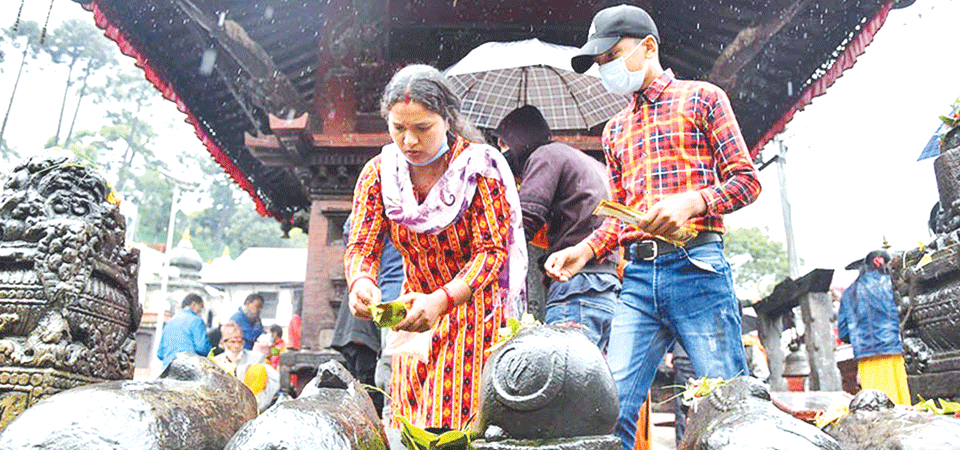When COVID-19 confronts culture, rituals go online

By Aashish Mishra
Kathmandu, May 26: On May 5, Puja Bhutiya’s worst nightmare came true. The 23-year-old, along with her parents and grandmother, tested positive for the coronavirus – two days before her wedding. This sent the family into a frenzy.
What could they do now? Should they cancel the ceremony? What about all the preparations they had already made? These were some of the questions that started nagging Bhutiya. Her father called the groom Pushpak Raj Magar’s father to break the news and ask for advice. Magar’s father consoled him and gave him a simple solution: “Let’s solemnise the wedding online.”
“Uncle (Magar’s father) suggested we get married via Zoom. Of course, there would be no garlanding or exchange of rings but the priest would perform a limited number of rituals and we would be able to wed without missing the auspicious date of May 7,” Bhutiya told The Rising Nepal.
And so they did. It was a novel experience and not everyone was happy. Bhutiya’s grandmother and Magar’s uncles and aunts have not accepted the marriage and insist on holding a physical ceremony once the situation improves. But the two at least got to tie the nuptial knot on their preferred date, albeit digitally, and that is all that matters, they said.
“We have to adapt our customs to the needs of the times,” Magar said.
With an average of 8,000 daily COVID-19 cases being recorded every day, Bikram Rijal also did not want a large celebration for his son’s coming-of-age ceremony Bratabandha on Sunday. “We did not want to invite anyone and wanted to have a safe function with only the family and the priest,” Rijal said. However, the elders of the family complained. They wanted to be able to see the boy and bless him on his special day.
Heeding their demand, Rijal thought of streaming the ceremony on Zoom. But the older relatives could not figure out how to use the app. So, he did the next best thing. “I broadcast my boy’s Bratabandha on Facebook,” Rijal said. “Everyone knows how to log on to Facebook and they can also give their blessings via the comments section. If anybody wanted to say something, they could send a voice message on Messenger.”
“Never in my life did I think I would be hosting a Facebook Live celebration but then again, I had also never thought I would have to live through a pandemic,” Rijal chuckled.
Many rituals like weddings, coming-of-age ceremonies and death rites (Shraddha) have moved online since the outbreak of COVID-19 in the country last year, said priest Madhav Chalise. “Since the lockdown was first imposed on March 24, 2020 I have performed numerous pujas via video calls,” Chalise shared. “Due to the health risks and the mobility restrictions, we, priests, cannot go to people’s houses, neither can they come to us. So, we use electronic means.”
Chalise informed that he recited the religious chants and mantras in front of his phone and people performed the necessary activities in front of their devices. The Dakshina is also deposited electronically into Chalise’s bank account or in his eSewa number.
“Many other priests are doing the same. This is the current trend.”
Chalise added, “We cannot stop following our culture even if we are in the middle of a pandemic. However, we can evolve and adapt.”
Because of the convenience such virtual ceremonies have offered, Chalise believes that the trend may persist even after the pandemic comes to an end.
Recent News

Do not make expressions casting dout on election: EC
14 Apr, 2022
CM Bhatta says may New Year 2079 BS inspire positive thinking
14 Apr, 2022
Three new cases, 44 recoveries in 24 hours
14 Apr, 2022
689 climbers of 84 teams so far acquire permits for climbing various peaks this spring season
14 Apr, 2022
How the rising cost of living crisis is impacting Nepal
14 Apr, 2022
US military confirms an interstellar meteor collided with Earth
14 Apr, 2022
Valneva Covid vaccine approved for use in UK
14 Apr, 2022
Chair Prachanda highlights need of unity among Maoist, Communist forces
14 Apr, 2022
Ranbir Kapoor and Alia Bhatt: Bollywood toasts star couple on wedding
14 Apr, 2022
President Bhandari confers decorations (Photo Feature)
14 Apr, 2022









